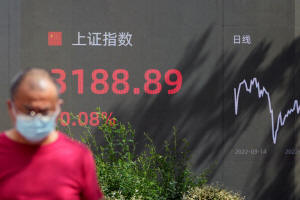Shares brush off China COVID curbs, dollar retreats
 Send a link to a friend
Send a link to a friend
 [November 22, 2022] By
Amanda Cooper [November 22, 2022] By
Amanda Cooper
LONDON (Reuters) -Global shares rose on Tuesday,
recovering some of the previous day's losses, as improved investor risk
appetite drove flows into equities and commodities, although concern
over more COVID infections in China kept gains in check.
The Federal Reserve will release the minutes from its most recent
meeting on Wednesday, which investors will scour for insight into
policymakers' views on the outlook for inflation and economic growth.
The dollar pulled back from strong overnight gains while oil edged up
after Monday's volatile sell-off.
The MSCI All-World index of shares rose 0.2%, putting it on course for a
second month of increases - its longest stretch of gains since late
2021.
In Asia, Chinese blue chips closed flat on the day, having fallen by as
much as 0.5%, while Japan's Nikkei rose 0.6%.
Chinese equities came under pressure after Beijing shut parks, shopping
malls and museums on Tuesday, while more cities resumed mass testing for
COVID-19, as cases spiked, which has fuelled concern about the hit to
the world's second-largest economy.

The Chinese capital said on Monday it was facing its most severe test of
the pandemic, raising the prospect that the government may have to
reimpose strict curbs on mobility and issue stay-at-home orders across
other cities.
The dollar pared some of the gains that took it to a 10-day high on
Monday, when investors ditched risk assets over China's COVID flare-ups
and was last down 0.2%. The dollar came under pressure in particular
against the euro and the yen, which rose by 0.2% and 0.3%, respectively.
"On the Fed side, tomorrow’s minutes will be important to watch, but the
recent Fedspeak has undoubtedly added a layer of caution to the dovish
pivot enthusiasm, which could mean investors may also be more reluctant
to over-interpret dovish signals from the minutes," ING strategist
Francesco Pesole said.
Meanwhile, the OECD said on Tuesday the global economy should avoid a
recession next year, but that the worst energy crisis since the 1970s
will lead to a sharp slowdown that will hit Europe the hardest.
[to top of second column] |

A pedestrian walks past a giant display
showing the Shanghai stock index, in Shanghai, China August 3, 2022.
REUTERS/Aly Song

Still, analysts at National Australia Bank questioned whether demand
for the U.S. currency would last.
"Evidence U.S. inflation has peaked and can fall significantly in
2023, together with China and Europe developments, convince us a USD
depreciation cycle is now in train," they said in a note on Tuesday.
U.S. Treasury yields eased across most maturities ahead of
Wednesday's minutes.
The benchmark 10-year Treasury yield fell 3 basis points to 3.80%,
while the two-year note yield also fell 3 bps to 4.50%.
Oil rose on Tuesday, a day after Saudi Arabia denied a media report
that it was discussing an increase in oil supply with OPEC and its
allies.
Brent crude futures rose 1.4% to $88.64 a barrel, having fallen by
as much as 6% the previous day, before Saudi Arabia issued its
denial and stemmed the decline.
"Markets remain subject to even greater volatility due to a total
dearth of market liquidity, as was all too evident in crude oil
futures, as they plunged on the WSJ story suggesting Saudi Arabia
may propose a very surprising increase in OPEC production at the
December meeting, only to fully reverse when this was denied," ADM
Investor Services chief global economist Marc Ostwald said.
Spot gold broke four days of losses, rising 0.2% to trade at
$1,741.40 an ounce.
(Reporting by Selena Li in Hong Kong, additional reportng by Kevin
Buckland in Tokyo; Editing by Lincoln Feast and Bernadette Baum)
[© 2022 Thomson Reuters. All rights
reserved.]
This material may not be published,
broadcast, rewritten or redistributed.
Thompson Reuters is solely responsible for this content.
 |